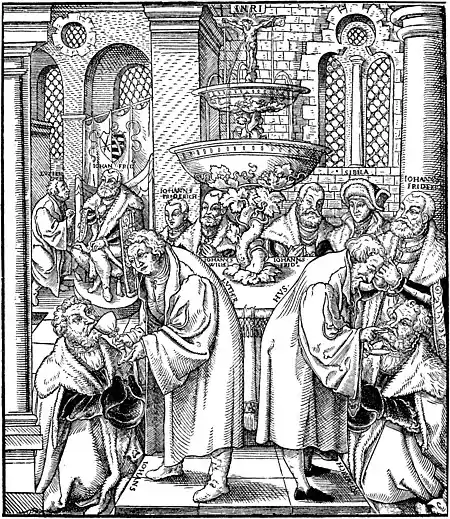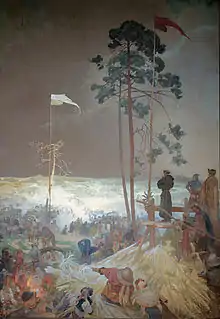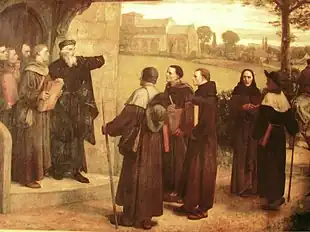Utraquism
Utraquism (from the Latin sub utraque specie, meaning "under both kinds") or Calixtinism (from chalice; Latin: calix, mug, borrowed from Greek kalyx, shell, husk; Czech: kališníci) was a belief amongst Hussites, a reformist Christian movement, that communion under both kinds (both bread and wine, as opposed to the bread alone) should be administered to the laity during the celebration of the Eucharist.[1] It was a principal dogma of the Hussites and one of the Four Articles of Prague.[2] After the Hussite movement split into various factions early in the Hussite Wars, Hussites that emphasized the laity's right to communion under both kinds became known as Moderate Hussites, Utraquist Hussites, or simply Utraquists. The Utraquists were the largest Hussite faction.

Following the victory of allied Utraquist and Catholic forces in the Hussite Wars, Utraquists constituted a majority of the Bohemian population until the outbreak of the Thirty Years' War, nearly two centuries later. The Battle of White Mountain, in 1620, marked the end of the Bohemian Revolt and, consequently, the end of almost two hundred years of Utraquist predominance.
History

Utraquism was a Christian dogma first proposed by Jacob of Mies, professor of philosophy at the University of Prague, in 1414.[2] It maintained that the Eucharist should be administered "under both kinds"[1] – as both bread and wine – to all the congregation, including the laity. The practice among Roman Catholics at the time was for only the priests to partake of the consecrated wine, the Precious Blood.[2]
Jacob taught that communion should be provided and taken under both kinds, which as a precept of Christ could not be changed by the church. Only those who received the utraquist (both kinds) communion belong to the church of Christ.[3]: 51 There is disagreement in sources about whether he, or early Utraquists, taught this was necessary for salvation[4]: 180 (as claimed by Catholic detractors such as Andrew of Brod), or necessary to receive the salvific effect of the eucharist[4]: 174 or an obligation.[5]: 518
The Utraquists were a moderate faction of the Hussites with strong respect for the sacrament and, generally, endorsed transubstantiation (in contrast to the more radical Taborites, Orebites and Orphans who followed Wycliffe more). They were also known as the Prague Party or the Calixtines – from calix, Latin for their emblem, the chalice.[2]
The Utraquists eventually allied themselves with the Catholic forces and defeated the more radical Taborites and Orphans at the Battle of Lipany in 1434.[2] After that battle, nearly all forms of Hussite revival were Utraquist, as seen with George of Poděbrady, who even managed to cause the town of Tábor, the famous Taborite stronghold, to convert to Utraquism.
References
- Wood 1907.
- Hughes 1915.
- Cermanová, Pavlína (2018). "Jakoubek of Stříbro's Czech Výklad Na Zjevenie and Its Latin Reception in Hussite Exegetical Texts". Listy filologické / Folia philologica. 141 (1/2): 45–73. ISSN 0024-4457.
- Levy, Ian Christopher (2017). "Interpreting the Intention of Christ: Roman Responses to Bohemian Utraquism from Constance to Basel". Europe After Wyclif. Fordham University Press: 173–195.
- Patapios, Hieromonk (2002). "Sub Utraque Specie: The Arguments of John Hus and Jacoubek of Stříbro in Defence of Giving Communion to the Laity Under Both Kinds". The Journal of Theological Studies. 53 (2): 503–522. ISSN 0022-5185.
Bibliography
- Ogden, C. K.; Richards, I. A. (1989) [1923]. "Chapter VI: The Theory of Definitions". The Meaning of Meaning. Harcourt Brace Jovanovich. ISBN 0-15-658446-8.
 This article incorporates text from a publication now in the public domain: Hughes, Joseph (1915). "Utraquism". In Herbermann, Charles (ed.). Catholic Encyclopedia. Vol. 15. New York: Robert Appleton Company.
This article incorporates text from a publication now in the public domain: Hughes, Joseph (1915). "Utraquism". In Herbermann, Charles (ed.). Catholic Encyclopedia. Vol. 15. New York: Robert Appleton Company. This article incorporates text from a publication now in the public domain: Wood, James, ed. (1907). "Utraquists". The Nuttall Encyclopædia. London and New York: Frederick Warne.
This article incorporates text from a publication now in the public domain: Wood, James, ed. (1907). "Utraquists". The Nuttall Encyclopædia. London and New York: Frederick Warne.
